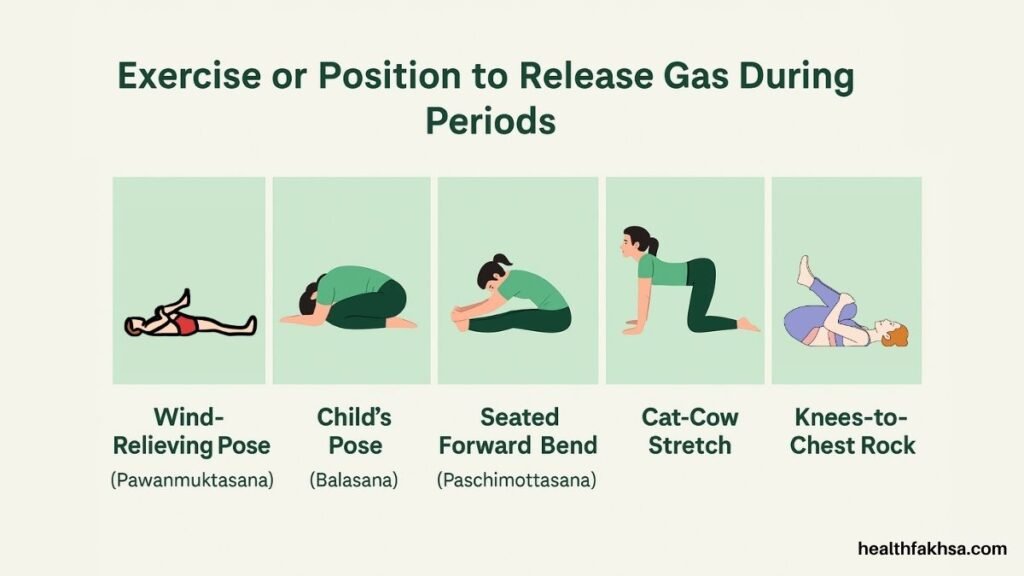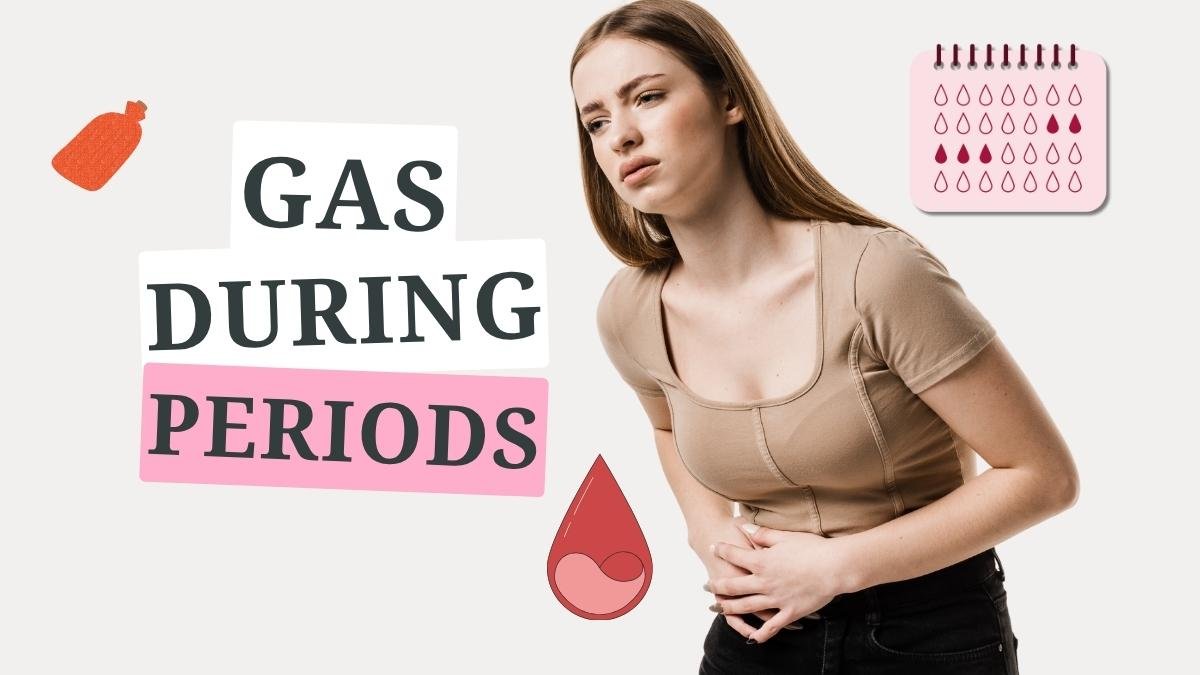Feeling gassy or bloated during your period? You’re not imagining it—and you’re definitely not alone. Gas during periods is more common than most people realize. That uncomfortable pressure, surprise bloating, or even embarrassing flatulence can feel like a frustrating side effect of menstruation.
Let’s dive into why it happens, whether it’s normal, and how you can actually feel better. You’ll find tips that work, signs to watch for, and the answers no one talks about—but everyone needs.
Why Is There So Much Gas During Periods?
Hormones. Yep, the same culprits behind mood swings and cramps are also behind your period gas. During your menstrual cycle, your levels of progesterone and estrogen fluctuate, which affects how your digestive system works.
- Progesterone slows digestion
- Estrogen affects fluid retention and bloating
- Increased prostaglandins can cause gut spasms
This mix can lead to trapped gas, bloating, and even mild constipation—just in time for your period.
What Causes Gas During Periods?
Let’s break it down:
- Slower digestion: Progesterone causes food to move more slowly through your gut.
- Water retention: Hormonal shifts make you retain water, contributing to that puffy, bloated feeling.
- Food sensitivities: Some women crave salty, sugary, or carb-heavy foods pre-period. These trigger more gas.
- Changes in gut bacteria: Your microbiome can shift with hormones, leading to more fermentation (and gas).
Understanding these causes helps you make sense of what your body is doing and why.
Is It Normal to Have Gas During Periods?
Absolutely. In fact, it’s so normal that doctors rarely blink when patients mention it.
But—what’s normal for one person isn’t always normal for another. If the gas is painful, excessive, or new, it might be time to keep a symptom log or talk to a healthcare provider. Especially if it’s joined by:
- Nausea
- Bowel habit changes
- Debilitating cramps
Why More Gas During Periods Than Usual?
Some months feel worse than others. Why?
- Stress: Can impact digestion and lead to IBS-like symptoms.
- Lack of sleep: Affects gut motility and bloating.
- PMS cravings: Dairy, sugar, or fried foods can worsen gas.
If your lifestyle changes or stress is high, your period symptoms—like gas—might be more intense.
Listen to your body. Some cycles may be easier than others based on what you eat, how you move, or even how much water you drink.
How to Release Gas During Periods Naturally
You don’t have to suffer through it. Try these gentle, body-friendly ways to release gas:
- Gentle yoga poses (like child’s pose or wind-relieving pose)
- Walk it out — movement helps move trapped gas
- Peppermint or chamomile tea
- Warm compress or hot water bottle
- Avoid carbonated drinks
These not only help with gas but also ease cramps and overall discomfort.
When Should You Worry About Excessive Gas?
If your gas is sudden, painful, or paired with new symptoms, it might be more than a hormonal shift. You should reach out to a doctor if you notice:
- Severe bloating that doesn’t improve
- Painful bowel movements
- Blood in stool
- Sudden, unexplained weight loss
- Periods becoming more irregular or painful
It could signal endometriosis, IBS, or other underlying conditions that need attention.
Home Remedies for Gas Relief During Periods
Keep it simple. Here’s what actually works for many women:
- Drink warm water first thing in the morning
- Eat smaller, frequent meals (avoid heavy portions)
- Try a magnesium supplement (consult your doctor)
- Keep a bloating diary for food tracking
- Prioritize fiber, but avoid sudden increases
These small shifts can make a big difference in reducing that heavy, gassy feeling.
Best Positions & Exercises to Release Gas During Periods

1. Wind-Relieving Pose (Pawanmuktasana)
- How to do it: Lie on your back, hug one or both knees to your chest, and hold for 20–30 seconds. Breathe deeply.
- Why it helps: Applies pressure to the lower abdomen and helps release trapped gas naturally.
2. Child’s Pose (Balasana)
- How to do it: Kneel on the floor, sit back on your heels, and stretch your arms forward while resting your forehead down.
- Why it helps: Gently massages abdominal organs and relaxes pelvic muscles.
3. Seated Forward Bend (Paschimottanasana)
- How to do it: Sit with your legs stretched forward, then gently bend and reach toward your toes.
- Why it helps: Encourages abdominal compression and eases bloating.
4. Cat-Cow Stretch
- How to do it: On all fours, alternate arching (cat) and dipping (cow) your spine while inhaling and exhaling.
- Why it helps: Stimulates digestion and eases both gas and cramps.
5. Knees-to-Chest Rock
- How to do it: Lie on your back, bring both knees to chest, and gently rock side to side.
- Why it helps: Relaxes your back and helps shift gas in the intestines.
💡 Bonus Tips:
- Gentle walking for 10–15 minutes after meals also helps gas move along.
- Avoid lying flat immediately after eating.
Does Diet Affect Period Gas?
Yes—big time. What you eat before and during your period can either reduce or trigger gas.
Foods to limit:
- Dairy (especially if lactose intolerant)
- Beans
- Carbonated drinks
- Sugar-free gum or artificial sweeteners
- Cruciferous veggies (broccoli, cauliflower)
Foods to try instead:
- Bananas (help with water retention)
- Ginger or fennel (anti-bloating)
- Plain rice, oatmeal, or yogurt with probiotics
The goal isn’t to be perfect—it’s to notice what works best for your unique cycle.
Bottom Line: Don’t Be Embarrassed—Gas During Periods Is Normal
It’s easy to feel awkward about period gas, but the truth is, it’s just another part of your body’s monthly reset. Understanding the “why” behind the bloat gives you the power to manage it—not just suffer through it.
From hormone swings to lifestyle factors, gas during periods is both common and manageable. With a few smart shifts and more awareness, you’ll start feeling better and more in control.
Your period is talking to you—listen, support your body, and treat yourself with patience.

